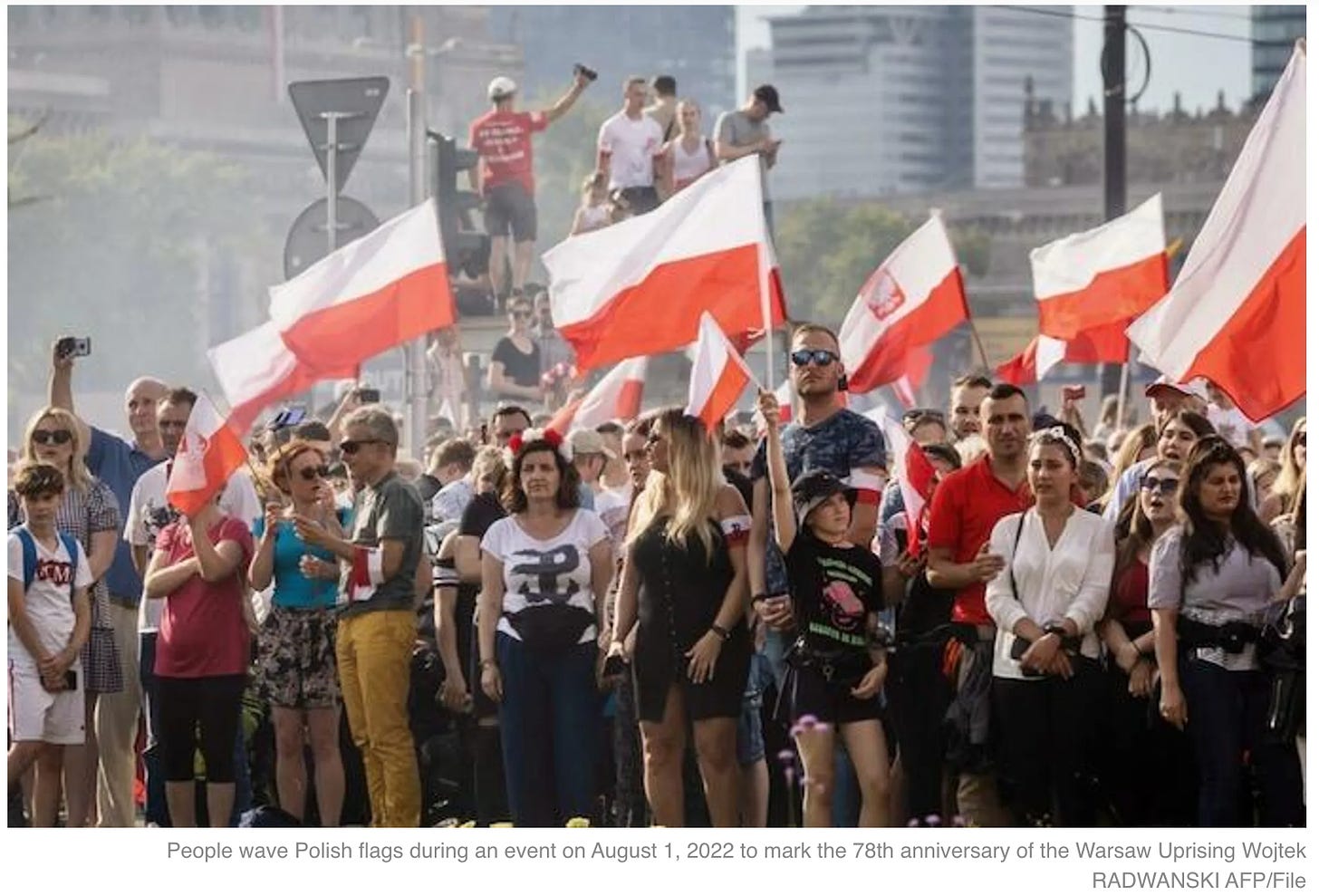War Is Hell...And It Ain't Cheap
So who pays for the damages inflicted by a war intended to conquer the world?
On September 1st, 1939, the Wehrmacht, the army of Nazi Germany, invaded Poland and introduced “blitzkrieg” (lightning war) into the lexicon of modern warfare. Poland fell quickly and suffered mightily under the Nazi yoke until the end of the war in 1945.
By the time the Allies defeated the Axis powers, and Hitler committed suicide in his Berlin bunker, more than five million Polish citizens had perished. Over the intervening 77 years, the Polish people and their governments have wrestled with whether to demand reparations for war damages from Germany.
Poland on Thursday estimated the financial cost of World War II losses to be 1.3 trillion euros (dollars) and said it would "ask Germany to negotiate these reparations".
"It is a major sum of 6.2 trillion" Polish zloty, said Jaroslaw Kaczynski, head of the ruling Law and Justice party and widely considered to be Poland's de facto leader.
Most of this sum "is compensation for the deaths of more than 5.2 million Polish citizens," he stressed.
Kaczynski said that receiving reparations would be a "long and difficult" process.
Yes, “long and difficult,” as in “Does anyone seriously think Germany will pay $1.3 trillion for a war that ended 77 years ago?” Not that time erases Germany’s moral responsibility for WWII and the terrible things the Nazis did, but no one alive today bears responsibility for those acts.
Does time erase a country’s moral responsibility for heinous acts committed by its forebears? I’d argue no, but that’s a question Germany needs to answer. It’s also a case Poland must make, and it’s essential to the future of Europe. Moreover, if Poland successfully argues its case before the international community, other countries may come forward with demands of their own. And, if Poland successfully makes its case for $1.3 trillion, what might countries like Norway, Greece, England, France, and others argue that they’re due?
Kaczynski was speaking at a conference dedicated to the presentation of a report on Poland's losses in the 1939-1945 war.
Since coming to power in 2015, Poland's governing Law and Justice (PiS) party has often championed the issue of war reparations.
Work on the reparations report began in 2017, when the conservative government insisted that Germany had a "moral duty" in the matter.
Not surprisingly, Germany rejects Poland’s claim, citing a 1953 decision by the then-communist Polish government not to seek reparations from East Germany. The question, of course, is whether that decision still has any legal significance today or whether it was simply a matter of convenience between two communist governments.
Another question, of course, is what international body has any authority and/or jurisdiction in this matter?
Germany has often rejected Poland's claims, pointing to a 1953 decision by Poland to renounce claims against East Germany.
The German government on Thursday turned down the Polish call to negotiate on reparations.
"The German government's position is unchanged, the reparations issue is closed," a foreign ministry spokesman said in an email to AFP.
He cited the 1953 decision, calling it a "significant foundation for Europe's order today".
The argument that the 1953 decision is a “significant foundation” for the European order of today seems disingenuous (and wrong), as it was made between two communist regimes dedicated to the destruction of the West. Moreover, it seems odd that Germany is clinging to a remnant of the communist order because they find it convenient.
After Germany capitulated and signed the Treaty of Versailles to end WWI, the treaty’s onerous terms bankrupted Germany. The resentment created by the punitive terms of the treaty laid the groundwork for what became WWII. Hitler deftly exploited the anger and bitterness created by the treaty and promised Germans they would never again prostrate themselves before the world.
After the end of WWII- Hitler’s suicide, the Nuremberg Trials, and the division of Germany into a communist east and democratic West- America helped to ensure that the West didn’t repeat the mistakes of WWI. The Marshall Plan helped to rebuild Germany and the rest of Europe. THAT was the “significant foundation” for today’s European order, not the 1953 agreement between the communist governments of Poland and East Germany.
Germany may be conveniently leaning on the 1953 agreement because it thinks it frees it from responsibility for Nazi atrocities, but the truth is that its argument is a chimera. The German government believes the 1953 agreement absolves it from any fault or financial claims, but they’re chasing an illusion. They still have a moral responsibility, one they’re seeking to evade based on a technicality.
The real question, of course, is not whether or not the German government owes reparations to Poland- I believe they do- but what amount represents justice? How do you value the lives of 5.2 million Polish citizens? How do you value the property and infrastructure damaged and destroyed by the Wehrmacht more than 70 years ago? And what of the suffering endured by the Polish citizenry, including the Jews of the Warsaw ghetto and those sent off to die in Nazi ovens in places like Treblinka and Auschwitz?
How do you place a value on those things? And if you can agree on a number, what does the Polish government do with the windfall? Where will the money come from if they successfully negotiate a $1 trillion+ settlement with the German government? Who will receive the funds? How will it be disbursed? And what criteria will be used to determine eligibility?
Such a massive sum of money raises so many questions, and determining the answers to those questions seems infinitely worse than the questions themselves. Most of those directly impacted have long since died, so who gets paid?
I can understand Germany’s reluctance to discuss reparations with Poland. They know that if they agree to pay Poland, other European countries will line up with their own demands- and they’d have legitimate arguments, just as Poland does. However, add up what promises to be a massive judgment, and you’ll have a number that could significantly impact the German economy.
Talk about the sins of the fathers being visited upon the sons, eh? Then again, perhaps it’s time for the sons to stop denying their responsibility for the damage their fathers and grandfathers wrought upon Europe.
Who says history isn’t circular?






